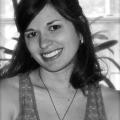Things I inherited from my father: Curly hair, a predisposition for autoimmune disorders, and an intense love for science fiction.
It started with The Twilight Zone. He had two VHS tapes filled with his favorite episodes and we would watch them together, curled up on the couch. “Nightmare at 20,000 feet,” “Monsters are Due on Maple Street,” “Eye of the Beholder,” I know them all by heart. I developed such an intense fascination with Rod Serling that I did some permanent nerve damage numbing my right eyebrow with ice so I could get the hang of lifting just the left one.
As I got older, I devoured Star Trek: The Next Generation and Ray Bradbury’s entire oeuvre. In college, I discovered that carrying around books by Kurt Vonnegut and George Saunders would make me seem more intellectual and the buzz was just as good.
And then, slowly, I began to realize that the best science fiction isn’t even fiction. It’s just science. I moved from Philip K. Dick and Ursula Le Guin to Stephen Hawking and Brian Greene.
It should be no surprise, then, that when it came time for me to write my own book, I would be so inspired by science. Why We Never Talk About Sugar, my new short-story collection, doesn’t have spaceships or robots or time travel. But it does have motifs and plots inspired by psychology, physics, neurology, geology, and medicine. It’s a sneaky way for me to combine my love of science with my writing endeavors.
Stories about science are, in some ways, necessarily artifacts of the times in which they are written. This is partly because science stories are so often metaphorical, or even allegorical. (You can feel the chill of the Cold War hanging over many Twilight Zone episodes.) It is also because science changes. What’s fantasy one day is pat fact the next. (The iPad was the stuff of sci-fi in the 60s.) At the same time, stories can date themselves by running afoul of later discoveries. (Think of the primitive computer interfaces in Blade Runner—a film set in the future.)
I’m actually looking forward to seeing my book “age” in this way. I like to think that it will give it character, like good wine or leather. I can already see it starting to happen, and the book hasn’t even been released yet. Since I wrote it, a group of scientists at CERN have found compelling evidence for the existence of the Higgs Boson, whose absence a young physicist in one of my stories laments! But it is this unpredictability that lends scientific discovery such excitement and suspense.
My book is not “science-fiction” exactly, but it is “science-y fiction.” I write about science because I want my stories to feel important—even if just to me. I want my characters to brush up against the great mysteries of the universe—How do we come to know reality? How do we come to know ourselves?—and perhaps to inspire the reader to spend some time pondering them too.
Writers are always told that we should write about what we love, what is in our hearts. Mine is filled with clockwork and magic and time machines and tattooed with equations for calculating spin vectors and the periodic table of elements. I get it from my father.

